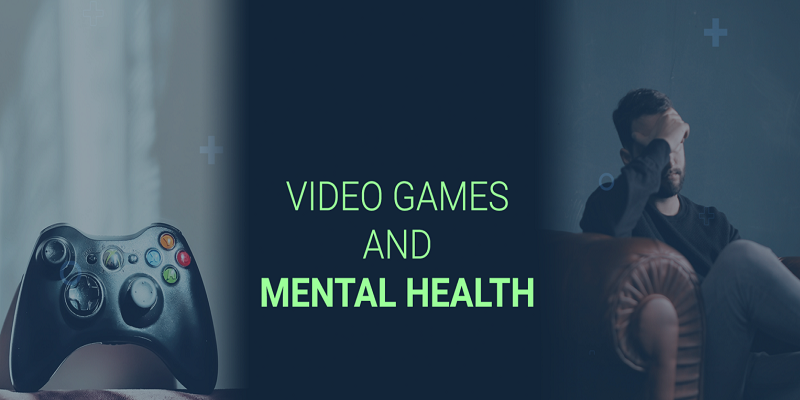
Due to lockdown and work from home culture, a lot of people are indulging into gaming more than usual hours. For some people it has become the mode of entertainment and relaxation, for some it has become a stress buster and for some it has become a part and parcel of life. According to Microsoft study – the Xbox Research Accessibility Community Feedback Program report – 84 per cent of respondents agreed that gaming has positively impacted their mental health over the past year, while 71 per cent said gaming helped them feel less isolated.
While in 2018 WHO coined the term gaming disorder, later the organisation promoted #PlayApartTogether campaign, endorsing gaming during Covid to feel less isolated. However, is there any possibility that excessive gaming habits can bring severe consequences to physical and mental health?

In conversation with AnimationXpress psychotherapist Dr. Vihan Sanyal shared, “Playing video games which depict violence can cause irritability and anger issues in an individual. There is little clinical data at the moment to back this up, however, it has been my observation that children and adults who have spent considerable amounts of time playing violent video games have displayed anger and irritability (including rage). Video games can be extremely engaging and are designed to capture a person’s attention. Focused attention on a particular object can put a person in a trance like state, which can directly influence our subconscious mind. The subconscious mind then influences our thoughts and behaviour.”
Playing video games during the pandemic while staying at home could lead to addiction, and therefore it is essential to understand the reasons behind playing these games. According to Dr. Sanyal, people enjoy video games because they are lonely, bored, and need mental stimulation to feel a sense of accomplishment and pleasure. To keep gaming addiction aside, “we need to understand the reason why we are attracted towards gaming and do we have other activities which we can do in addition/instead of gaming to strike a balance. A blend of activities is likely to keep us from becoming addicted to gaming,” Dr. Sanyal added.
According to the doctor, “Gaming is encouraging a sedentary lifestyle, we are becoming comfortable with the idea of isolation and are spending long hours at home or in a room escaping reality and being comfortable living in a virtual world and engaging with online friends and avoiding friends in the real world.”
Today we are bombarded with ads, be it on mobile or television, so it is easy for anyone to get exposed to Real Money Games (RMG) as they entice you with the fact that you can gain more money. However, if one fails to keep a check on their spendings and keep on losing out on the cash, they face real life consequences. Today, RMG platforms are promoting it with the tag that it might bring in financial loss, despite knowing that people are still playing RMG games (taking debts for playing, to the extent of committing suicide on financial loss as reported in the media), this behaviour requires mental health supervision. Dr. Sanyal believes that the area “is crossing over towards gambling and often it’s a case of poly-addiction (Gaming & Gambling Addiction). Family and friends should encourage their loved ones’ to seek the help of a mental health professional who can help them to manage these addictions through counselling interventions, medication and/or rehab.”
The world is shifting to a largely digital first mode, and we have access to devices like “Alexa” and “Google Home that helps us control the functions of our home with our voices! According to Dr.Sanyal, we need to keep a tab that we are not becoming complacent or dependent on them because it can further drop in energy levels and physical activity which is again not healthy.
Gaming is a form of entertainment, rather interactive entertainment and has its own allure when there’s not much to do around. To keep a gamer’s mental health in check they should take extra care of their mental health. He believes that by engaging in gaming activities for long hours, gamers can subject themselves to a range of mental and physical health issues. “Gamers need to ensure that they take frequent breaks between gaming sessions. The longer the break between gaming sessions the better.”
He suggested that one needs to look for activities like going for long walks, conversing with friends and family members in-person or over the phone (completely avoid talking about games during your conversation), spending time with a pet, cooking, listening to music, dancing, exercising, meditating, reading. Simply, one needs to balance their life with other activities than gaming alone. He shared that for professional gamers, it is essential to take regular intervals from games and to stay in touch with the real world.
He shared, “Please seek the help of a doctor or a mental health professional if you or a loved one is showing any of these signs:
- Disturbance in sleep patterns
- Spike in irritability, anger and rage
- Playing games non-stop and avoiding social interaction
- Losing touch with reality and not being able to distinguish between what’s virtual and what’s real.
- Disturbance in eating patterns. Look for increase/decrease in appetite
- Feeling low for no reason
- Frequent shift in moods
- Weight gain and lack of willingness to exercise
- Joint pains from physical strain, especially in the wrists.”
Dr. Sanyal concluded by saying, “Playing age appropriate content is important for developing minds. The mind may not be mature enough to handle the high level of violence, cruelty and dark themes which many of the games depict.”

